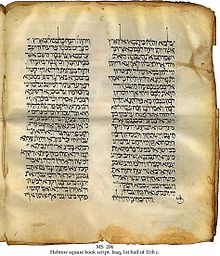Tanach
The Tanakh (from the Hebrew acronym תַּנַךְ tanaj), also known as Mikra, is the set of twenty-four canonical sacred books in the Judaism. It is divided into three large parts: the Torah (Law), the Nevi'im (Prophets) and the Ketuvim (Writings). The texts are mostly written in ancient Hebrew, although there are also passages in ancient Aramaic (Book of Daniel, Book of Ezra, and others). The traditional Hebrew text is called the Masoretic text.
The Catholic and Orthodox Old Testament contains seven books not included in the Tanakh, called Deuterocanonicals. The translations of the Bible used by Protestant Christian groups adhere to the Hebrew canon, that is, only thirty-nine books of the Tanakh. For Catholics and Orthodox, however, the Old Testament is made up of 46 books instead of 24. The Protestant Churches include 39 books in the Old Testament, omitting 7 books known as Deuterocanonical. In both cases, the figures derive, at least in principle, from a different distribution of the original text as a whole.
Terminology
The acronym Tanach are the three initial Hebrew letters of each of the three parts that compose it. In its most limited sense Torah refers to the five books of Moses: Genesis, Exodus, Leviticus, Numbers and Deuteronomy. It can also be used to refer to the entire Bible (the five books, the prophets and the hagiographers, also known as "Tanakh").
- The Torah, ‘Instruction’ or ‘Law’
- The Nevi'im (dissentation), 'Prophets'
- The Ketuvim (....................
The initial letter kaf of כְּתוּבִים (Ketuvim) (written from right to left) is the final letter in the acronym תַּנַ"ךְ (Tanakh), and because it is the last letter it takes the form of final kaf (ךְ) and pronounced soft, like J, not K; that is why it is Tanaj and not "Tanak".
Many biblical scholars advocate the use of the term Hebrew Bible (or Hebrew scriptures) as a substitute for less neutral terms with Jewish or Christian connotations such as (such as Tanakh or Old Testament).
History
The list (or canon) of inspired Hebrew Biblical books was definitively established for Judaism in the second century AD. C. by the consensus of a group of wise rabbis who had managed to escape the siege of Jerusalem in the year 70 and who had founded a school in Yamnia. These books are known as protocanonical, and form the Palestinian Canon or Tanaj.
This canon meant the rejection of some books, which became known as deuterocanonical, that a group of Jewish teachers had included in the Canon of Alexandria or Bible of the Seventy in the 2nd century BC. C. The "deuterocanonical" form means 'second canon' in contrast to the term 'protocanonical' which means 'first canon'. However, the first canon, in chronological order, was that of Alexandria.
Content
The books in the Tanakh are grouped into three sets: the Law or Instruction (Torah), the Prophets (Nevi'im) and the Writings (Ketuvim). The books that belong to each section are listed below:
Torah (תּוֹרָה) Law or Instruction
The Torah is also known as the Pentateuch, from the Greek πέντε, pente, 'five', and τεῦχος, teûjos, 'book cover'; from the Hebrew חֲמִשָּׁה חֻמְשֵׁי תּוֹרָה, Chamishah Jumshei Torah, 'the five fifths of the Torah' or simply חֻמָּשׁ, Chumash, 'five', a conjugation of (Chamesh).
- Genesis (cf. Genesis)Bereshit ‘in the beginning’
- Exodus (......) [shmot ‘names’
- Leviticus (liturgical institutions) [vayikra ‘(and) called it’
- Numbers (as a matter of urgency) [bamidbar ‘in the desert’
- Deuteronomy.dvarim ‘Palabras’
Nevi'im (נְבִיאִים) or the Prophets
- Joshua (cf.........Yehoshua ‘Yeho (name of God) is salvation’, ‘saving’
- Judges (in the same spirit) [Shoftim ‘judges’
- Samuel (I Samuel and II Samuel)Shmuel ‘God listens’
- Kings (I Kings and II Kings)melajim ‘reyes’
- Isaias (¢ ¢ ¢Ü ¢Ü ¢Ü ¢Ü ¢Ü ¢Ü ¢Ü ¢Ü ¢Ü ¢Ü ¢Ü ¢Ü ¢Ü ה) [Yeshayah ‘Yah (God's name) will save’] or ())))) מ) א) ה ה ה) [Yeshayahu]
- Jeremiah (cf.Irmiya ‘ Already (the name of God) rises’ or (cf.Irmiyahu]
- Ezekiel (cf.)ה)אה) [Yejezquel ‘God will strengthen’
- The book of the 12 minor prophets: (רtree) у у у уть ה) [climb asarin Aramaic, ‘doce’
- Hosea (.....) [Hoshe'a ‘save’
- Joel (“He is God”)
- Amos (END END FORM) [Amos ‘occupied’, ‘he who carries the burden’
- Obadiah (municipalities) [Ovadyah ‘Servant of Yah (God's name)’
- Jonah (cf.Yonah ‘paloma’
- Micahs (מה) [MijahThere are those who think it means ‘who like Yah?’
- Nahum (relative amount of money) [Najum ‘confort’
- Habacuc (spoke in Spanish) [Javaquq, a plant, in acadio, or ‘opened’]
- Sofonías (margins) [Tzfaniyah ‘Norte De Yah’, hidden from Yah’ or ‘Yah Water’
- Hageo (.......)Jagay ‘distrust’ in Semitic languages, ‘my rest’ in Hebrew
- Zechariah ()の)ה) [Zakhariyah ‘Yah (God's name) remembers’
- Malachi (costing) [Malaji ‘my messenger’, or ‘my angel’
Ketuvim (כְּתוּבִים) or the Writings
- psalms (KJV/day) [Tehilim ‘abanzas’
- Proverbs (CIATES) [Mishlei ‘to appear’, ‘to be like’; in its intensive form, ‘compare’, ‘saint’
- Job (מוווה) [Iyov ‘who endures hardship’
- El Cantar de los Cantares (cf.Shir HaShirim — superlative— ‘the most beautiful of the songs’, ‘the song par excellence’
- Rut (ה) [Rut ‘the faithful companion’
- Lamentations (אה) [Eijah]
- Ecclesiastes (imagination) [Qohéleth ‘the assembler’]; (accessoryκκλιαστς) [Ekklesiastés ‘member of the congregation’ or ‘member of the assembly’
- Ester (ה) [Ester] o (מוה) [Hadasa] [ ‘mirto’, ‘arrayán’ or ‘murta’], [Esterin Assyrian-Babylonian, ‘astro’ or ‘star’
- Daniel (struggles) [Daniyel ‘God is my Judge’ or ‘God’s Judge’.
- Ezra-Nehemiah: composed of Ezra (END) ה) [Ezra ‘to whom God helps’ and Nehemiah (.........)Nejemyah or Nejemyahu ‘reconforted by God’
- Chronicles (I Chronicles and II Chronicles) [Divrei HaYamim Alef, Bet]
Translations
The Tanach is currently being translated from ancient Hebrew and ancient Aramaic into modern Hebrew in the State of Israel, in the so-called Tanach Ram translation.
Contenido relacionado
Codex Calixtinus
Constantine i
Nahuatl poetry

